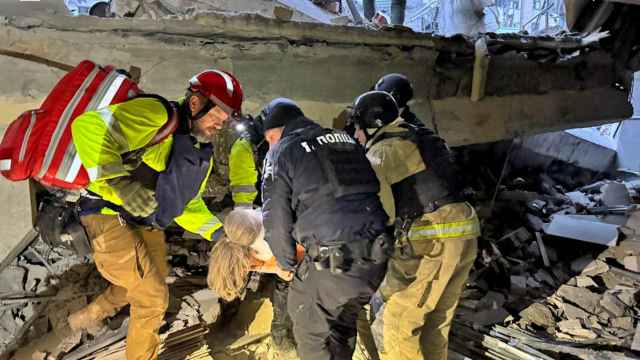Prominent Russian scientist and television host Sergei Kapitsa died Tuesday in Moscow. He was 84.
Son of world-renowned physicist and Nobel Prize winner Pyotr Kapitsa, Sergei Kapitsa was born in Cambridge, Britain, and moved with his family to the Soviet Union in 1935.
Sergei Kapitsa, a graduate of the Moscow Aviation Institute in 1949, is best known in Russia as the host of popular science television show "Ochevidnoye-Neveroyatnoye," which can be translated as "Obvious But Incredible."
For that show, which first aired in 1973, he was awarded UNESCO's Kalinga Prize for the Popularization of Science.
Kapitsa, who was editor-in-chief of the Russian edition of Scientific American magazine, also made numerous contributions to physics in supersonic aerodynamics, applied electrodynamics and accelerator physics.
Kapitsa served as vice president of the Academy of Natural Sciences of Russia, president of the Eurasian Physical Society, senior research associate at the Lebedev Physics Institute of the Russian Academy of Sciences, and professor at the Moscow Institute of Physics and Technology.
"He made science interesting for many millions of people. He combined the talents of both a scientist and a TV journalist," broadcaster Vladimir Pozner said, Interfax reported Tuesday.
Both President Vladimir Putin and Prime Minister Dmitry Medvedev expressed their condolences Tuesday.
Kapitsa's brother, Andrei, was a Russian geographer best known for his role in the discovery of Antarctica's massive underground Lake Vostok. He died last year in Moscow at the age of 80.
A Message from The Moscow Times:
Dear readers,
We are facing unprecedented challenges. Russia's Prosecutor General's Office has designated The Moscow Times as an "undesirable" organization, criminalizing our work and putting our staff at risk of prosecution. This follows our earlier unjust labeling as a "foreign agent."
These actions are direct attempts to silence independent journalism in Russia. The authorities claim our work "discredits the decisions of the Russian leadership." We see things differently: we strive to provide accurate, unbiased reporting on Russia.
We, the journalists of The Moscow Times, refuse to be silenced. But to continue our work, we need your help.
Your support, no matter how small, makes a world of difference. If you can, please support us monthly starting from just $2. It's quick to set up, and every contribution makes a significant impact.
By supporting The Moscow Times, you're defending open, independent journalism in the face of repression. Thank you for standing with us.
Remind me later.






